
No. 8, 2024 | 27 June 2024
Go to:
From FRSA's Executive Director
FRSA’s June Board meeting has just concluded and I have to say, we are so fortunate to have such an engaged, active, knowledgeable and energetic Board. To be honest, the strength and calibre of Board Directors at FRSA has always been a strong asset for the organisation – and the current Board membership under the guidance of Teresa Jayet as Chair is no exception.
With the end of the financial year imminent, I am very pleased that we go into the 2024-2025 knowing that we have secured our core, peak funding from the Department of Social Services for a further two years – through until June 2026. This brings us into alignment with the grant periods for DSS Families and Children (FaC) Activity programs and the Attorney-General’s Department’s Family and Relationship Services Program (FRSP), the Family Law Services programs. With so many program types in these areas under review (or about to be reviewed) being able to continue to provide strong engagement with the Government and other stakeholders, to represent the views and voices of the FRSA members is of vital importance to our workplan over the next two years. Significant intensity and resource investment will need to be made over the next 12 months to influence the outcomes of these review processes.
I always say we don’t do this alone – and it is our members who give us support and strength in these endeavours.
FRSA will again be convening the Strategic Leadership Forum in Canberra, in a Parliamentary Sitting week – taking place on the 10th and 11th September. So, I ask you to SAVE THE DATE! With a Federal Election to be held by May next year – this is prime timing for engaging with relevant Ministers and other politicians at a point to shape the future of the Family and Relationship Services sector. We know the value of our services and early indications from review processes reinforce the importance of our programs to the children, families and communities of Australia. We now need to be working to secure ongoing investment into the future.
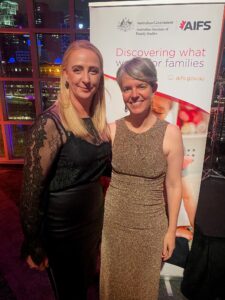
I am also delighted to let our readers know that FRSA has been successful in securing a further 12 months funding for the Communities of Practice Pilot program that we have been delivering for the last 2 years. Funded by the Department of Social Services through the Australian Institute of Family Studies, these Communities of Practice grow from strength to strength and we look forward to bringing you more regular news about their activities and learnings over the coming year. There was a presentation on this Pilot at the FRSA Conference – and you can find out more about it here or by contacting the Communities of Practice Project Officer – Lisa Curtis – here at the FRSA office.
Speaking about Conferences, I just wanted to extend my congratulations to Liz Neville, Acting Director at AIFS and her team on their amazing Conference at the beginning of the month. I know my team loved attending – as delegates and/or exhibitors – it is another great way to stay connected with the sector and with members and to hear about their work. I did manage to get along to the AIFS celebratory dinner where it was great to catch up with Dr Rae Kaspiew in her closing weeks with the Institute. We wish her well in her retirement and thank her for the legacy she leaves.
Here at FRSA, I am also sad to say that our Administrative Officer, Carol Reeve is leaving us as of today. She has been an incredibly valued member of our team, and we are sorry to see her go. We have been fortunate to attract Heidi Aynsley to this position and she has been working with Carol over the last two weeks to learn the ropes. If you call or contact the office – I am sure you will make Heidi welcome.
Kind regards,
Jackie Brady
FRSA Executive Director
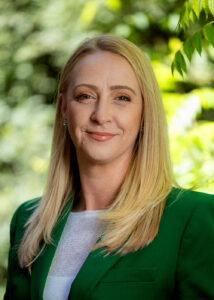
AIFS 24 Conference – Families Thriving?
Earlier this month we were delighted to attend the Australian Institute of Family Studies (AIFS) 2024 Conference – Families Thriving? Asking big questions. Influencing change.
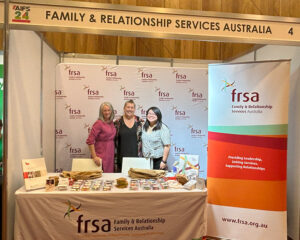
FRSA had an exhibition booth at the conference and it was fantastic chatting with conference delegates and other exhibitors about their priorities and interests and where our work connects.
Members of the FRSA team were able to get to a number of presentations and enjoyed the strong line-up of plenary speakers as well as concurrent presentations. It was encouraging to hear the deep thinking going on across the research, practice and policy sectors to address the challenges facing families in Australia.
FRSA National Conference 2024 Presentation slides now available
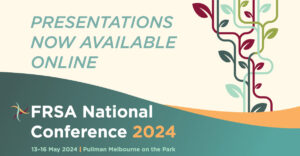 The FRSA Conference, held in Melbourne in May, showcased the great richness and diversity of the sector with 70 concurrent session presentations and five symposiums. With permission of the presenters, we have made as many presentation slides as possible available via the FRSA Conference page. To access these presentations simply open or download the PDF version of the program and click on the session you are interested in.
The FRSA Conference, held in Melbourne in May, showcased the great richness and diversity of the sector with 70 concurrent session presentations and five symposiums. With permission of the presenters, we have made as many presentation slides as possible available via the FRSA Conference page. To access these presentations simply open or download the PDF version of the program and click on the session you are interested in.
Stay tuned for the recordings of the keynote presentations and panel discussion, which will be uploaded to FRSA’s YouTube channel in the coming weeks.
Anglicare Australia launches Cost of Living Index
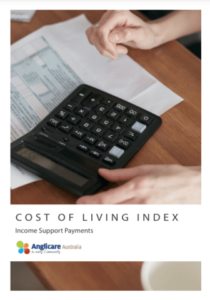 Last week Anglicare Australia released its Cost of Living Index, showing that people living on Centrelink Payments can’t afford essentials like rent, food, and transport. The Anglicare Australia Cost of Living Index shows that:
Last week Anglicare Australia released its Cost of Living Index, showing that people living on Centrelink Payments can’t afford essentials like rent, food, and transport. The Anglicare Australia Cost of Living Index shows that:
- A family of four with two parents on payments can’t afford essential expenses, falling short by $386 a week
- A single parent on the Parenting Payment falls behind by $262 a week
- A person on JobSeeker living in a sharehouse falls behind by $69. They could not afford to move out of shared accommodation.
- Housing is the biggest living cost facing households, with average rents rising by more than 50% since 2020. All calculations include the highest rates of Commonwealth Rent Assistance.
Industry standards developed to help tackle child sexual abuse online content
Two industry standards developed by the eSafety Commissioner have been registered, requiring a range of online services to do more to tackle child sexual abuse and pro-terror material on their platforms.
The standards cover Designated Internet Services (DIS), like apps, websites, file and photo storage services, and some services which deploy or distribute generative AI models; and Relevant Electronic Services (RES), including dating sites, online games and messaging services.
The standards include requirements for some generative AI services where they have not incorporated controls to reduce the risk of generating high impact material like synthetic child sexual exploitation material. This may include some apps that generate pornography or ‘nudify’ images without effective controls to prevent their application to children.
The standards will come into force six months after registration once a 15-day parliamentary disallowance period has expired. eSafety Commissioner Julie Inman Grant said the registration of the standards was an important step in providing greater protection for all Australians from the worst-of-the-worst online content.
Read the eSafety Commissioner’s media release here.
2024 National Working Families Report
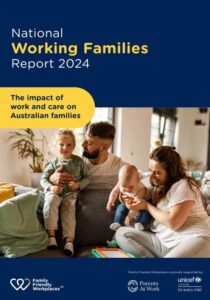 Parents At Work has teamed up with UNICEF Australia to publish the 2024 National Working Families Report which aims to provide meaningful change to working parents and carers in their work-life juggle through actionable recommendations to employers and government, supported by data and insights.
Parents At Work has teamed up with UNICEF Australia to publish the 2024 National Working Families Report which aims to provide meaningful change to working parents and carers in their work-life juggle through actionable recommendations to employers and government, supported by data and insights.
Analysing the experience of more than 6200 Australian working families, the Report analyses comparable data from the inaugural 2019 National Working Families Survey and this year’s survey responses to measure the impact of changing workplace trends on working parents and carers.
In gauging the experiences, needs and challenges of respondents five years on, the Report also provides anecdotes from respondents on the pressures and demands they face and provides practical actions for employers and policymakers to drive change and better support employees facing work-life conflicts.
The survey results show that employers that embrace family-inclusive policies and practices are having an impact, and that working parents and carers who work for certified Family Friendly Workplaces reported fewer negative impacts and were more satisfied with their work life balance overall. Read more

Measuring What Matters – enhanced survey announced
The Albanese Government has announced an investment of $14.8 million to expand and enhance the General Social Survey, which is run by the Australian Bureau of Statistics, to strengthen Australia’s first national wellbeing framework – Measuring What Matters.
Enhancement of the General Social Survey will provide more data and analysis to supplement traditional ways of measuring the economy like GDP, employment, inflation and wages.
The revitalised General Social Survey will enable collection of data across a range of topics including:
- Overall life satisfaction
- Participation in volunteering
- Experience of discrimination
- The ability of a household to raise emergency funds in response to unexpected circumstances
- Participation in formal study and informal learning
- Attendance at cultural events and participation in cultural activities
- Prevalence of serious psychological distress and chronic conditions
- Trust in others and key institutions
Every three years, the Government will release a comprehensive Measuring What Matters statement examining trends in wellbeing, how we are tracking over time, where we’re doing well and where we need to do better.
Inquiry into Family Violence Orders
The House of Representatives Standing Committee on Social Policy and Legal Affairs has commenced an inquiry into access to family violence orders (FVOs) for victim-survivors in the family law system.
The inquiry will have regard to:
- The risk of an escalation in the aggressive and violent behaviour of the perpetrator and heightened risk to the partner and children during family court proceedings
- The current barriers for litigants in the family law system to obtain and enforce FVOs
- How FVOs could be more accessible for victims of violence going through the family law system
- Any other reform that would make it safer and fairer for victims of violence in the family law system who need the protection of FVOs.
The Committee is seeking written submissions by Friday, 19 July 2024.
New phase of Stop it at the Start campaign launched
On 17 June the Albanese Government launched a new phase of the evidence-based Stop it at the Start campaign.
The Hidden Trends of Disrespect aims to educate parents and care givers of young people aged 10-17 years about the new and hidden forms of disrespect young people are engaging with every day online.
Key to the campaign is the Algorithm of Disrespect™, an interactive tool simulating the average young Australian’s social media feed to demonstrate to adults the disrespectful content and influences young people are exposed to every day online.
The Algorithm of Disrespect™ is available on the website https://www.respect.gov.au/ along with conversation guides which will help adults to have meaningful discussions with young people. They are available in Easy Read and translated languages.
Criminal Justice Data Asset – building evidence on violent perpetrator reoffenders
On 20 June, the Albanese Government announced investment in the Criminal Justice Data Asset. This cross-government asset will establish a longitudinal and nationally linked criminal justice data asset to provide more evidence on perpetrators of family, domestic and sexual violence and their engagement in the justice system.
It will be established in collaboration with police enforcement, criminal courts and adult corrective services departments and has the potential to provide critical information on issues such as:
- the number and rate of offenders who come into contact with the criminal justice system and who use violence.
- the number of perpetrators held to account
- risk factors associated with perpetration
- recidivism rates and time to return to justice
- pathways through the justice system
- what is working to keep people out of the system
- overrepresentation of First Nations peoples in the justice system.
Prevention of gender-based violence against older Australians
Earlier this month the Albanese Government announced that more than $940,000 will be allocated to develop materials for in-home support workers that will be aimed at helping them to better identify and intervene to support where older people are experiencing family, domestic or sexual violence in their homes.
This may include where older Australians are experiencing financial or emotional abuse, or coercive control, by their intimate partners or another family member.
The initiative is funded under the First Action Plan Priorities fund, announced as part of the National Plan to End Violence against Women and Children 2022-2032, and will run through to 2025-26.

World Elder Abuse Awareness Day
It was World Elder Abuse Awareness Day (WEAAD) on 15 June. The day aims to bring together individuals, communities, and organisations to raise awareness to the growing issue of elder abuse.
Elder abuse is any act which causes harm to an older person and is carried out by someone they know and trust such as a family member or friend. The abuse may be physical, social, financial, psychological or sexual and can include mistreatment and neglect.
See how FRSA Members commemorated the day:
- Relationships Australia Canberra & Region’s Senior Relationships Services Team were at Wagga Marketplace speaking to the community about services available for aging Australians.
- Anglicare Tasmania shared a blog post about where to go to find out more information about elder abuse and their support services.
- Centacare Brisbane highlighted the day as an opportunity for communities to promote a better understanding of abuse of older persons and their team and client came together at the Enoggera Social and Community Hub to raise awareness of elder abuse.
- Mercy Community spoke to their team of aged care professionals to understand more about what elder abuse is, what you can do and what to look out for in their latest blog post.
- Relationships Australia Tasmania staff attended COTA (Council On The Ageing) Tasmania’s Lifelong Respect Walks Against Elder Abuse in Hobart and Launceston on 14 June.
- Better Place Australia took part in a local ‘Your Life. Your Choice.’ Seniors financial workshop. They also published a media release about the need for awareness and the rising demand they are experiencing for their support services.
- Anglicare SA residents and employees across their residential aged care sites came together to acknowledge World Elder Abuse Awareness Day.
- Relationships Australia Northern Territory held a morning tea with the Council on the Ageing NT. They also launched a new video about elder abuse. Watch the video below:

NAIDOC Week
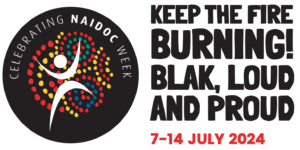 National NAIDOC Week is coming up on 7-14 July. National NAIDOC Week is a time to recognise and celebrate the history, culture and achievements of the First Peoples. It is an opportunity for all Australians to learn about First Nations cultures and histories, and participate in celebrations of the oldest, continuous living cultures on earth.
National NAIDOC Week is coming up on 7-14 July. National NAIDOC Week is a time to recognise and celebrate the history, culture and achievements of the First Peoples. It is an opportunity for all Australians to learn about First Nations cultures and histories, and participate in celebrations of the oldest, continuous living cultures on earth.
This year, the National NAIDOC theme is ‘Keep the Fire Burning! Blak, Loud & Proud’, a call to honour the enduring spirit of First Nations cultures and an invitation to stand in solidarity with First Nations communities and amplify the voices that represent them.
Support and get to know your local Aboriginal and/or Torres Strait Islander communities through activities and events held across the country.
Find an event near you or register your own NAIDOC week event.
Submissions: Australian Journal of Community Work
ACWA is seeking original papers for the 2025 edition of the Australian Journal of Community Work across the following sections:
Peer-Reviewed – fully explored and referenced academic papers based on either quantitative and/or qualitative research or exploration of specific issues/themes.
From the Field – this is for non-reviewed papers and is often people’s stories about grassroots projects they are working on or have experienced – this is great for those wanting to publish but need somewhere to start.
From the Study Desk – non-peer reviewed, a place where students can contribute as they move through their learning and practical experiences, growing into, or further developing, their professional community work skills.
Visit the AJCW webpage or contact the Editor, Dr Anne Jennings, via ajcw@acwa.org.au
Forced Marriage Specialist Support Program applications open
Applications are now open for the Forced Marriage Specialist Support Program (FMSSP). The FMSSP will provide needs-based, fit-for-purpose education, prevention and early intervention to support people who are at-risk of, or who have experienced, forced marriage, complementing the existing Support for Trafficked People Program.
The objectives of the FMSSP grant opportunity are to:
- Deliver a coordinated national response to support the victims and survivors of forced marriage, working with all communities that experience forced marriage, including CALD communities.
- Assist those at risk of, or who have experienced forced marriage by providing access to support that is needs-based, and provided for as long as is needed for their recovery and healing due to the negative impacts of being at risk of, or in a forced marriage.
- Provide those at risk of, or who have experienced, forced marriage a safe, confidential, person-centered, culturally sensitive, trauma-informed entry point to the FMSSP.
- Establish processes to screen eligible victims and survivors for legal, physical, psychological, family and community indicators of forced marriage, outlined in Australian legislation, standards, research and good practice, and drawing on the lived experience of victims and survivors.
- Provide specific prevention and early intervention support to those at risk of forced marriage, including establishing and maintaining linkages with other services for referral and establishing processes under the FMSSP for escalating higher risk cases for appropriate support and referral to ensure client safety.
- Educate the community in a culturally safe way about the importance of both parties willingly consenting to marriage and raise awareness and understanding about forced marriage and coercive control and their rights under Australian law.
Applications close 9:00 pm AEST on 5 August 2024. Find out more on GrantConnect.
Single Mother Families Australia (SMFA) survey
Single Mother Families Australia (SMFA) and Swinburne University of Technology are looking for people who are or have been involved with the child support scheme to take part in a survey.
The aim of this study is to examine the process of applying for and receiving child support, and how it has affected your financial stability and security, and receipt of government payments, such as the Family Tax Benefit. Your involvement in the research will help to identify where the process can be improved, and how government policies and programs help or hinder financial security. The results of the survey will be used to inform advocacy campaigns to work towards fairer programs, policies, and services.
Please complete this 30-minute confidential survey which will help improve the scheme: 2024 Child Support Survey. The survey closes 31 July 2024.
Children’s Participation in Australian Family Law research
The Children’s Participation in Australian Family Law research project is seeking children and young people aged 10 to 21, who have experience participating in the family law system, to take part in an interview and a workshop.
This research project seeks to understand children and young people’s experiences of participating in family law decision-making processes. It will also co-create a Children’s Participation Toolkit, to help children and young people better understand their right to express their views ands be heard.
They are recruiting children and young people:
- between 10 and 21 years old; and
- living in New South Wales, Queensland or Victoria; and
- whose parents have separated and engaged with the family law system since 2019, and whose family law matter has been finalised; and
- for whom there is no anticipated issue of safety or risk arising from participation in this project.
If you can help by identifying potential participants who meet these criteria, please share this link: https://forms.gle/A51QCSfMuuwsp9379
Participants will receive a $250 e-gift card ($125 for the interview and $125 for the workshop).
This research has been approved by Southern Cross University’s Human Research Ethics Committee (Approval number 2024/033).
For more information, please contact Lead Chief Investigator, Dr Georgina Dimopoulos: georgina.dimopoulos@scu.edu.au
SUNSHINE CIRCLES – Albury
SUNSHINE CIRCLES – Shepparton
HEY LITTLE WARRIOR – Sale
A DEVELOPING BRAIN – Sale
VIC
AOD Specialist Family Violence Advisor | Odyssey House Victoria
ACT
Family Dispute Resolution Practitioner (FDRP) | Relationships Australia Canberra & Region
WA
Coordinator Family Law Services | Anglicare WA
NT
Clinician | headspace | Anglicare NT
Family Lived Experience Worker | headspace | Anglicare NT | headspace
Youth & Family Worker | Anglicare NT
If you have any events you’d like listed on the FRSA Events and Training Calendar or job vacancies you’d like listed on the FRSA Jobs Board, email Communications Officer, Vanessa Lam at communications@frsa.org.au. Please note that posting onto the FRSA website is reserved for FRSA Members only.

Community Housing Organisations Response to DFV: Toolkit & Standard | Community Housing Industry Association
This toolkit has been designed to assist community housing organisations better understand and respond to incidents of domestic and family violence. It has a number of resources that have been designed for community housing organisations to customise and fit within their organisation’s practice.
Social Connection: Organisation Roles for Connected Communities | Social Connection
Swinburne University of Technology has published a series of evidence-based resources to support practitioners deliver successful programs that foster social connections within communities. The resources include a guide for planning activities as well a program evaluation toolkit to help measure quality and impact.
Mapping child and family hardship across Australia | Social Ventures Australia
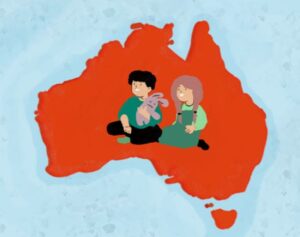 This article looks at the geographic spread of significant early childhood disadvantage in Australia and identifies locations with the highest levels of disadvantage. It also quantifies the level of need in each location to target and advocate for early childhood hubs. It also provides data which will help identify areas of need for service providers and funders working in child and family related fields.
This article looks at the geographic spread of significant early childhood disadvantage in Australia and identifies locations with the highest levels of disadvantage. It also quantifies the level of need in each location to target and advocate for early childhood hubs. It also provides data which will help identify areas of need for service providers and funders working in child and family related fields.
Children’s Mental Health and Climate Change and Disasters Mini-toolkit | Emerging Minds
The original toolkit, Reframing Children’s Mental Health was designed to help Australia’s child mental health experts and advocates communicate in ways that expand support for large-scale policy changes that improve children’s outcomes. This toolkit builds on that framework, providing specific guidance and recommendations for communicating about the relationship between climate change, disasters, and the mental health of children and families.
Communities for Children outcomes measurement matrix | Australian Institute of Family Studies
This resource is designed to assist Communities for Children (CfC) service providers with locating valid and reliable tools to measure program outcomes. It may also be useful for other service providers who work with children and families. Please note that inclusion on this list does not imply endorsement of particular products.
The health and wellbeing of First Nations people in Australia’s prisons 2022 | Australian Institute of Health and Welfare
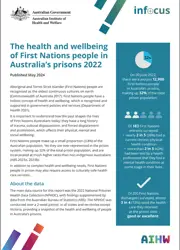 AIHW released its latest report on the health and wellbeing of First Nations people in Australia’s prisons. First Nations people are over-represented in Australia’s prisons. First Nations people in contact with the criminal justice system often have complex health and wellbeing needs and may require access to culturally safe health care services. On 30 June 2022, around 12,900 First Nations people were in Australia’s prisons, making up 32% of the prison population.
AIHW released its latest report on the health and wellbeing of First Nations people in Australia’s prisons. First Nations people are over-represented in Australia’s prisons. First Nations people in contact with the criminal justice system often have complex health and wellbeing needs and may require access to culturally safe health care services. On 30 June 2022, around 12,900 First Nations people were in Australia’s prisons, making up 32% of the prison population.
Identifying and Responding to Multi-Perpetrator Family Violence and Abuse | Relationships Australia NSW
Relationships Australia New South Wales has published a Multi-Perpetrator Family Violence Abuse Resource Package (MFVA) developed in partnership with Settlement Services International and Indian(sub-cont) Crisis and Support Agency. The tools and resources in this package have been developed to support MBCP providers and frontline practitioners to identify and respond to multi-perpetrator abuse in families and improve the delivery of their services to culturally and linguistically diverse community groups. This project focused on Arabic and Indian sub-continent communities, but these resources can be applied in other situations of MFVA, including other migrant and refugee communities, religious communities, and other cultural contexts.
Aboriginal and Torres Strait Islander voices have the solutions to suicide prevention: who’s listening and who’s taking action? | Lowitja Institute
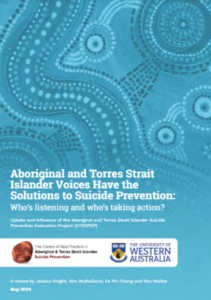 The findings outlined in this review demonstrate the widespread uptake and influence of ATSISPEP report findings and recommendations across primary health networks and Aboriginal and Torres Strait Islander suicide prevention policy and practice at local, state and national levels.
The findings outlined in this review demonstrate the widespread uptake and influence of ATSISPEP report findings and recommendations across primary health networks and Aboriginal and Torres Strait Islander suicide prevention policy and practice at local, state and national levels.
Touched by Suicide: Wellbeing support guide | Lifeline
Lifeline has produced an online wellbeing guide for people impacted by suicide or suicidal behaviour of someone they are not immediately related to or directly connected with such as a neighbour, celebrity or notable community member. This is distinct from other support guides that focus on people who are bereaved by the suicide of someone close to them.
Informed and safe, or blamed and at risk? Examining the merits and limits of domestic violence disclosure schemes in Australia and New Zealand | Monash University & University of Liverpool
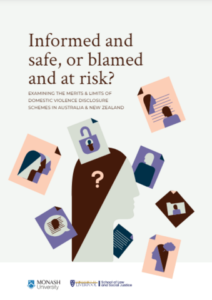 This research represents the first study in Australia and New Zealand to examine the degree to which domestic violence disclosure schemes provide an effective intervention for victim-survivors in enhancing their safety.
This research represents the first study in Australia and New Zealand to examine the degree to which domestic violence disclosure schemes provide an effective intervention for victim-survivors in enhancing their safety.
Non-payment of child support as economic abuse of women and children: a literature review | Women’s Legal Services Australia
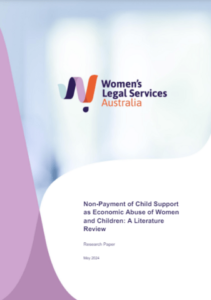 The research finds that the child support system requires urgent reform to recognise the devastating consequences for women and children of non-payment of child support as economic abuse, and appropriate responses are urgently needed to address this form of economic abuse to create safer and more equitable outcomes for women and children.
The research finds that the child support system requires urgent reform to recognise the devastating consequences for women and children of non-payment of child support as economic abuse, and appropriate responses are urgently needed to address this form of economic abuse to create safer and more equitable outcomes for women and children.
Tipping the balance: LGBTIQ+ teens’ experiences negotiating connection, self-expression and harm online | Office of the eSafety Commissioner
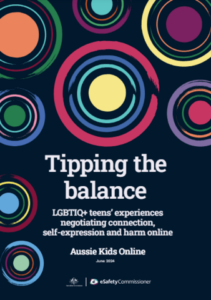 This research explores the online experiences of LGBTIQ+ teens in Australia and how they negotiate connection, express themselves, and deal with harm online.
This research explores the online experiences of LGBTIQ+ teens in Australia and how they negotiate connection, express themselves, and deal with harm online.
Building a trauma-informed algorithmic assessment toolkit | ARC Centre of Excellence for Automated Decision-Making and Society
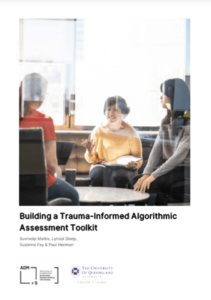 This research identifies a practical framework for AI design, development and deployment for algorithmic supported community services that are cognisant and inclusive of the diversity of human experience, particularly people who have experienced trauma.
This research identifies a practical framework for AI design, development and deployment for algorithmic supported community services that are cognisant and inclusive of the diversity of human experience, particularly people who have experienced trauma.
Children’s mental health when experiencing multiple adversities: Practice skills for effective conversational maps | Emerging Minds
This paper examines five practice perspective shifts that are often utilised by family and relationship practitioners who want to engage with children about every aspect of their lives.
Migration and ageing: how cultural and linguistic diversity is set to boom among older Australians | ARC Centre of Excellence in Population Ageing Research
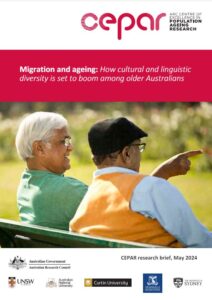 This research brief assesses wellbeing outcomes across the lifecycle (e.g. education, employment, retirement, health) by three high-level migrant and CALD categories: place of birth, language use at home and spoken English proficiency.
This research brief assesses wellbeing outcomes across the lifecycle (e.g. education, employment, retirement, health) by three high-level migrant and CALD categories: place of birth, language use at home and spoken English proficiency.
Take-up of Parental Leave Pay and Dad and Partner Pay among Australian parents | Australian Institute of Family Studies
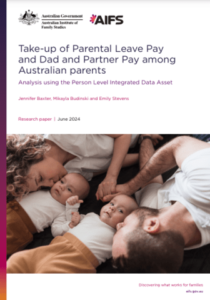 This report examines mothers’ take-up of Parental Leave Pay (PLP) and fathers’ take-up of Dad and Partner Pay (DAPP), two government payments designed to support eligible working mothers and fathers to take time off work to care for newborn or newly adopted children. By exploring take-up, the authors fill a significant gap in knowledge about the proportion of eligible parents who were using these payments, and the factors explaining different levels of take-up for these parents.
This report examines mothers’ take-up of Parental Leave Pay (PLP) and fathers’ take-up of Dad and Partner Pay (DAPP), two government payments designed to support eligible working mothers and fathers to take time off work to care for newborn or newly adopted children. By exploring take-up, the authors fill a significant gap in knowledge about the proportion of eligible parents who were using these payments, and the factors explaining different levels of take-up for these parents.
Want to submit something to the FRSA eBulletin?
If you have an news item or event that you would like to be featured in a future eBulletin please submit your announcement via the form below or email communications@frsa.org.au with the subject “FRSA eBulletin submission”.
Please note FRSA members receive priority for items posted in the eBulletin. And to keep information current, relevant and useful, submissions will not be repeated from week to week.
Subscribe
Subscribe to receive future eBulletin editions directly to your inbox!







